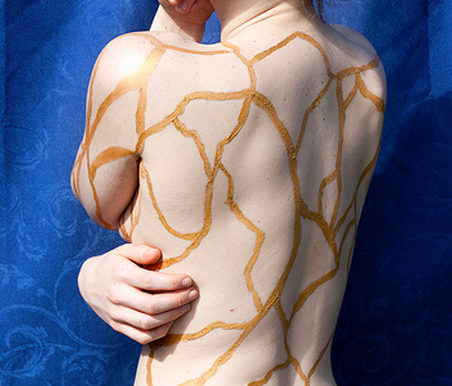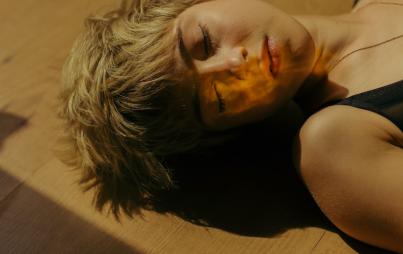
It was many years before I began to experience life inside my body.
When I was a little girl, my relationship with my body was tenuous. Rather than being tightly anchored by skin and bones, I often floated above my body; I watched myself move and interact with others from my vantage point on the ceiling like an actor on a stage.
I told my cousin about my floating once. She laughed and told me how crazy that was. People don't float above their bodies, she said. Chagrined, I kept my floating to myself after that, but it was many years before I began to experience life inside my body.
I didn't have a fairy-tale childhood, unless it was one of those dark and grim ones that really shouldn't be read to children. I grew up in a household of trauma and abuse, where the only constant was the mother who allowed it to happen at best and inflicted it at worst.
My mother used to talk about her parenting mistakes; that time she threw my Legos all over my bedroom and stomped on them, or when she flipped my dresser over because I hadn't cleaned my bedroom well enough. Those were never the moments that lingered in my mind, though. Those explosions were brief and she felt bad afterwards. The moments that I remembered the most were the quiet ones, where my mother turned to ice in an instant; those moments stretched into weeks, and sometimes months, and I welcomed the explosions when they came, to remind me that I was still alive after all.
I spent most of my childhood alone. I was an only child in a family that became more isolated as the years went on. Our home was filled with silence and ghosts; my mother had been abused by her own parents, and she would close the curtains and sit in the dark listening to sad songs while crying and pouring her heart out to 5-year-old me. We didn't speak of those ghosts outside of those moments, and I quickly learned that it was my job to keep my mother's secrets. Eventually, I had my own secrets to keep, too.
I grew up into the kind of adult a child like me often becomes. I craved love the way others crave drugs, but I didn't know what it felt like to receive love; I only knew what it felt like to act as a caretaker for someone else's needs and wants. I knew nothing of healthy boundaries or self-love, and I was too busy destroying myself in my own mind to even consider the idea that I was valuable or worthy of healthy, unfettered love. What I knew was that I was the lazy selfish liar that my parents had always told me I was; that deep, dark, void inside of me didn't deserve love, and anyone who looked inside would know the truth.
When I was an adolescent, I found a book on my mother's shelf that was written for adult survivors of childhood sexual abuse. I read it cover to cover, but I didn't find hope there. Instead, since it had been written in the '80s, it inundated me with statistics and dire predictions about my future. I would never sustain a healthy relationship; I was more likely to be sexually abused again; I was likely to be the same kind of mother that my mother had been. According to the book, I might as well have given up on life at age 12, because the things done to me had already set my future in stone.
There was no hope and no healing, just a predetermined tragic destiny.
I rebelled then at the idea of myself as broken or damaged. I rejected the bleak future that book depicted. My mother had always told me not to "let the bastard win"— our abuse might have been inescapable, but she was determined not to let her abusers destroy her—and I became just as determined to do more, to be better, and to prove those assholes wrong. And, in some ways, I did. But, most of what the book had predicted came to pass all the same.
The thing about success is that it is entirely subjective. I could point to many outward trappings of success as "proof" that I conquered my demons. But, I could also list just as many examples of my own failures as "proof" that my demons conquered me. If triumphing over childhood abuse is defined as nothing more than meeting a societal idea of "normalcy" and fitting in, it becomes incredibly tempting to paint my life with beautiful, shallow brush strokes and never look too closely at the details.
By my late 20s, I had a successful career; I had a husband, a house, children, and a sparkly Tiffany ring. But, I also had an unfaithful, alcoholic husband who blamed me for his struggles. In the midst of the destruction of our marriage, with newborn twins, I didn't pause to grieve, heal, or even breathe; I enrolled in law school, traveled to Europe, and married a new man many years my senior.
For a long time, I didn't know why my relationship with that new man was so excruciating, or why a man who loved me so much could make my skin crawl with revulsion. He was a good man, I told myself, and he often reminded me that it was my own brokenness that was sabotaging our relationship. I tried to believe him, but eventually a teeny tiny piece of me knew what was wrong: He felt just like home.
After I left my last husband, I rejected everything that I had once embraced. I threw off the veneer of normalcy and sameness, and I allowed myself to acknowledge my own victimhood for the first time in my life. Rather than continuing to live my life to prove others wrong, or to prove how little my abuse had impacted me, I conceded that the bastards might not have "won," but they sure had fucked me up. Then, at 33 years old, I made the radical decision to live my life for me.
It's been nearly four years since I entered therapy, and I recently began to question why the hell I'm still not fixed. Surely, after four years, I should be okay, I told my therapist. But, she gently informed me that complex trauma can take decades, not years, to fully recover from.
It makes sense, I guess. The trauma I experienced lasted decades and so will the recovery. But, where I once found despair in the idea of myself as broken, now I find it comforting. It's okay to not have my shit together, even after four years. Today, "success" is measured in moments present and joyful, and in acknowledging when moments are neither present nor joyful.
Today, I am not my mother. Today, I hugged my daughter when my skin was crawling. Today, I modeled healthy boundaries and self-care for my children. Today, the steel band that encases my chest was clamped tightly around me for only a few crushing moments. Today, I experienced the physical sensation of hunger. That is progress, and that is what matters.
My favorite book as a teenager was Gone With the Wind; I often repeated the passage where Rhett Butler tells Scarlett O'Hara that their relationship is simply too broken to fix. If you drop a plate, and then glue it back together, it will always be broken, he told her on his way out the door. Who wants an old, broken, glued-together plate? Who wants to be an old, broken, glued-together plate?
In Japanese culture, they treasure their heirloom pottery (kintsugi). When they break, they repair them with gold powder to make the cracks look like gold. Some people say that the golden lacquer used to repair the imperfections makes these pots even more beautiful than they were before they were broken.
My plate was broken long before I had any choice in the matter. I spent most of my life fearing that brokenness and desperate not to be damaged. Now, I see that there is no shame in being imperfect, damaged, or even broken. There is no success to be found in hiding it and pretending that it doesn't exist, either. But, there is beauty and grace and perhaps even bravery in slowly and carefully piecing all of those broken pieces back together—with a little bit of gold mixed in.
I am not the damage done to me and neither are you; but the healing is entirely our own.







